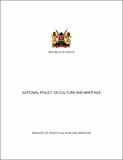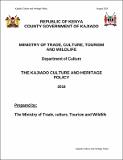National Policy on Culture and Heritage 2009
| dc.date.accessioned | 2023-05-30T11:12:22Z | |
| dc.date.available | 2023-05-30T11:12:22Z | |
| dc.date.issued | 2009 | |
| dc.identifier.uri | https://repository.kippra.or.ke/handle/123456789/4227 | |
| dc.description.abstract | The centrality of culture and national heritage to the socio-economic and sustainable development needs of a country can neither be over-emphasized nor gainsaid. The global partnership established among Countries around the Millennium Development Goals (MDGs) underlines the important role of culture in meeting international development challenges. Culture as articulated by the United Nations Educational Scientific and Cultural Organization (UNESCO) and Universal Declaration on Cultural Diversity (UNCD) takes diverse forms across time and space. The diversity is embodied in the uniqueness and plurality of the identities of groups and societies making up humankind. Policies that aim at the inclusion and participation of all citizens are guarantees of social cohesion and a prerequisite for peace. The government recognizes the vital role culture plays in sustainable development. In particular, cultural diversity widens the range of options open to every citizen; it is one of the roots of development, understood not simply in terms of economic growth but also as a means of achieving a more satisfactory intellectual, emotional, moral and spiritual existence | en |
| dc.language.iso | en | en |
| dc.publisher | Ministry of State for National Heritage and Culture | en |
| dc.relation.ispartofseries | Policy Paper;2009 | |
| dc.subject | Cultural Practices | en |
| dc.subject | Culture | en |
| dc.subject | National Heritage | en |
| dc.subject | Historical Sites | en |
| dc.subject | National Dress | en |
| dc.title | National Policy on Culture and Heritage 2009 | en |
| dc.type | Policy Paper | en |
| ppr.contributor.author | Ministry of State for National Heritage and Culture | en |
Files in this item
This item appears in the following Collection(s)
-
Policy Papers [116]




